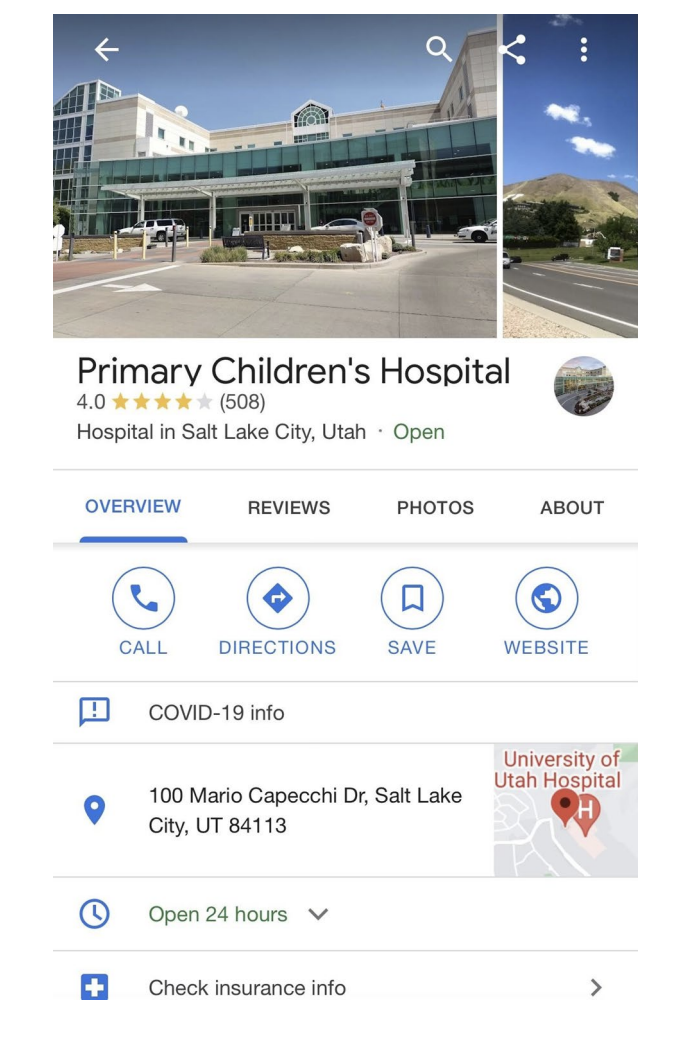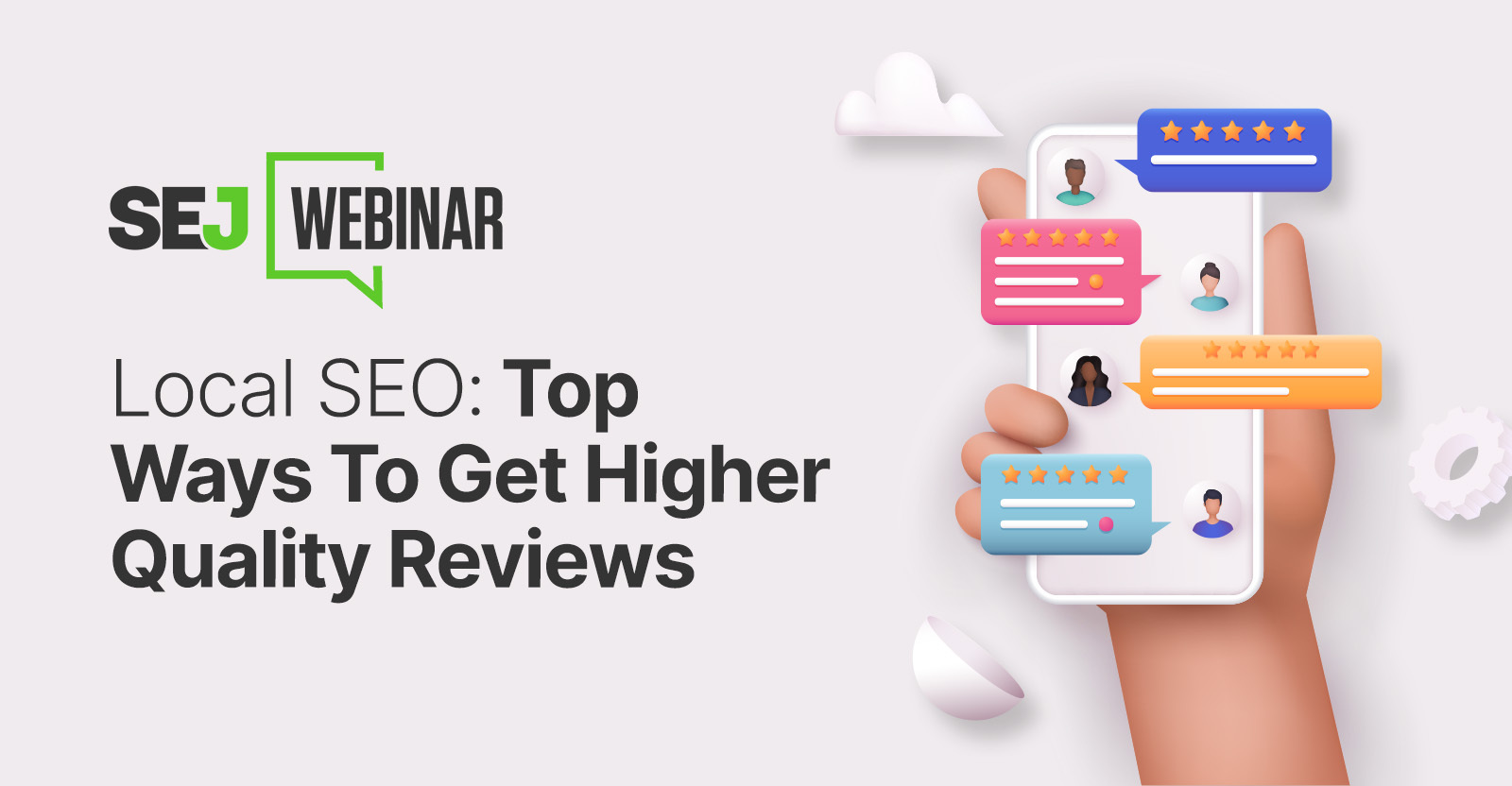Worried about the online reputation of your local business?
Are you happy with the reviews?
Wondering how you can better meet your customer’s expectations and get closer to five stars?
Online reviews could make or break your business – especially in the smartphone era of on-the-go research.
On June 8, I moderated a webinar with Marc Hansen, Sr. Director of Revenue Marketing at Podium, and Kelley Knott, Co-Founder of Intrepy Healthcare Marketing.
Hansen and Knott showed how to stay competitive, get ahead of comparison research, and win customers before they even walk into your store.
Here is a summary of the webinar.
To access the entire presentation, complete the form.
What Is Local SEO?
Local businesses rely on their online presence to thrive, with 97% of users searching for local businesses online.
And when we say local business, we’re talking about businesses with a physical presence.
Local SEO is search engine optimization for local marketing.
How does Google determine local search rankings?
- Relevance – connect searches with answers.
- Distance – the proximity of the searcher to your business.
- Prominence – online reputation for your business.
[Discover how to win in local SEO] Instantly access the webinar →
Local SEO Myths
Many small local businesses still don’t believe in the power of SEO. The truth is, when you have a small marketing budget, you should consider SEO.
Let’s look at some myths that are holding most businesses back.
Myth #1: Organic search and local SEO are the same.
FACT: Organic SEO is based on relevance to search terms. Local SEO, on the other hand, is based on location signals.
Myth #2: Reviews are a “nice-to-have.”
FACT: Reviews are a “must-have.”
Myth #3: How consumers discover business hasn’t changed much over the past few years.
FACT: The way consumers discover your business is changing. You should, too.
Myth #4: Consumers want the ‘best,’ and they’re willing to travel to get it.
FACT: Consumers want ‘the best,’ and they want it close by.
Searches for “best burger” increased by 400% YoY.
“Near me” or “close by” type searches grew by more than 900% over two years.
Myth #5: Print and online advertising drive in-person visits.
FACT: Local smartphone searches drive in-person visits.
A pretty storefront isn’t going to cut it anymore. When a consumer’s top priority is quality and convenience, your online reviews will speak 1,000 words.
[See what consumers are looking for aside from convenience] Instantly access the webinar →
Myth #6: Google prioritizes the best ranking businesses, regardless of whether or not they’re local.
FACT: Google prioritizes local businesses in the results for local searches.
Now that we have debunked these myths, it’s time to optimize your local SEO.
6 Best Practices For Local Search
The following simple steps can help make the most of your local search listings and attract better reviews. Make sure you’ve completed these best practices! The more qualified the customers you attract, the higher the chance that they’ll have a great experience.
1. Verify Your Location
More than 70% of all searches go through Google. That means Google will often list verified results higher than those they’re unsure about.
How to verify your listing:
- Verify by phone, email, or mail.
- Review all information for accuracy or any last-minute changes.
- Remember that you can’t update your business name until the verification process is complete.
2. Add High-Quality Photos
Businesses with profiles that feature photos see 35% more click-throughs than profiles without images.
In addition, listings with photos receive 42% more requests for driving directions.
[See what your profile should include] Instantly access the webinar →
Keep these best practices in mind:
- Optimize all photos for both desktop and mobile devices.
- Prioritize taking attractive pictures of your business, products, or services.
- Add metadata to each image to boost your ranking without making keywords directly visible.
3. Keep Your Google Business Profile (GBP) Up-To-Date
Did you know? 31% of consumers report they are more likely to look at a local business’s GBP listing before visiting than they did before the pandemic.
Information needed for your GBP listing:
- Who you are (name, website, business description, category, attributes, opening date, photos).
- Where you are (address, service area).
- When customers can visit you (hours of operation, holiday hours).
 Screenshot from search for [Primary Children’s Hospital], Google, June 2022
Screenshot from search for [Primary Children’s Hospital], Google, June 20224. Use Keywords
Location keywords are powerful because 72% of consumers who search for a local business visit a business within 5 miles of their current location.
How to use keywords to your advantage:
- Use keywords in your description anywhere you can while still making it sound natural.
- Start with service in location (SiL) (add [in “your location”] to all of your products or services).
- Use a keyword generator tool if you’re struggling to get started.
5. Increase & Manage Your Online Reviews
Reviews greatly influence consumers. 88% say reviews make the difference in their decision to try a new business.
Moreover, consumers are willing to travel farther and spend more to patronize a business with a higher rating.
[See the statistics] Instantly access the webinar →
How to increase your total number of reviews and average rating:
- Ask for reviews via text.
- Create a Google review link shortcut.
- Respond to both negative reviews and positive reviews. Use a reputation management platform.
Using these local SEO best practices, you can refine your listing and attract more local customers. Reach them when and where they’re looking for what they need.
By properly managing your local SEO, you increase the likelihood of attracting engaged customers who leave happy. When they do, don’t let the relationship end.
Ask for a review.
6. Respond To Reviews
Using a reputation management platform, you can begin to engage with reviewers to continue improving your reputation.
[Learn the best way to respond to reviews] Instantly access the webinar →
[Slides] Local SEO: Top Ways To Get Higher Quality Reviews
Here’s the presentation:
Join Us For Our Next Webinar!
Beyond ROAS: Aligning Google Ads With Your True Business Objectives
Join Justin Covington, Director of Paid Channels Solutions at iQuanti, as he breaks down the Google Ads changes and show you how to use value-based bidding to drive measurable results.
Image Credits
Featured Image: Paulo Bobita/Search Engine Journal


